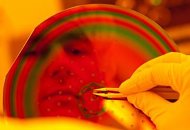Thursday, October 6th 2011
Quantum Computers: Research Into New Way of Creating Qubits With Improved Stability
Qubits are the quantum version of the smallest building block used in conventional digital computers today. They are subject to the laws of quantum physics, which means they possess the remarkable property of allowing them to be in a superposition of both zero and one states, until a measurement is taken, at which point they become either a one or a zero. This property allows the result of many possible outcomes to be calculated at once, making a quantum computer insanely fast and powerful - just the sort of thing you need for such things as climate modelling, code-breaking, Folding@Home style distributed projects, advanced artificial intelligence - and possibly gaming computers of the like never before seen, if they can be made small and cheaply enough. To give an idea of the enormous advance in processing power possible, physicist Rui-Rui Du of Rice University, Houston, Texas, who is researching the creation of stable qubits explained:
Unfortunately, the catch is that these stable qubit pairs, known as "majorana fermions", have not yet been seen in experiments. Physicists now think that it might be possible to create these by "marrying" a two dimensional topological insulator to a superconductor. Due to the peculiar properties of topological insulators, the elusive majorana fermions should be created precisely where the two materials meet, allowing them to potentially be used for quantum computing.
Further refinements of topological insulators and experiments will determine whether such qubits can be made, whether they're stable enough and whether they can be used in a practical commercial computer. Finally, whether the technology to enable this kind of processing power will ever become viable and cheap enough to incorporate into a high performance desktop PC or gaming console remains to be seen.
Source:
TG Daily
In principle, we don't need many qubits to create a powerful computer. In terms of information density, a silicon microprocessor with 1 billion transistors would be roughly equal to a quantum processor with 30 qubits.It's not hard to see that using something like 64 qubits would increase processing power beyond anything we can imagine now.However, creating these qubits and keeping them stable enough to perform useful calculations with has been a serious challenge since research into quantum computers began. However, if an approach called "topological quantum computing" bears fruit, then keeping qubits stable might just get a lot easier. In this method, qubits will be made in pairs, with an almost immutable shared identity, which makes them much more stable and resilient to interference (presumably because one qubit can "error-correct" for corruption in the other qubit) which causes them to lose their delicate state of superposition, an effect called quantum decoherence.
Unfortunately, the catch is that these stable qubit pairs, known as "majorana fermions", have not yet been seen in experiments. Physicists now think that it might be possible to create these by "marrying" a two dimensional topological insulator to a superconductor. Due to the peculiar properties of topological insulators, the elusive majorana fermions should be created precisely where the two materials meet, allowing them to potentially be used for quantum computing.
Further refinements of topological insulators and experiments will determine whether such qubits can be made, whether they're stable enough and whether they can be used in a practical commercial computer. Finally, whether the technology to enable this kind of processing power will ever become viable and cheap enough to incorporate into a high performance desktop PC or gaming console remains to be seen.

28 Comments on Quantum Computers: Research Into New Way of Creating Qubits With Improved Stability
Interesting read Qubit, I also read somewhere else that it would be approximately 50 years before our transition into Quantum computing (with current progress in the tech)
theres many qubits in there
OH GOD HE STARTED THE THREAD. QUBITS ARE SELF AWARE. SKYNET IS UPON US.
by Mussels: OH GOD HE STARTED THE THREAD.
Self Aggrandizement at its finest!:p
They say that they think that they can create 'stable qubit pairs'. But after they've been created, how will they be manipulated into some kind of practical computing substrate/platform/call it what you will?
"Oh yes! we can create gagillion petaflop quantum computers! The world will be changed forever!"
"Real artificial intelligence! We'll be able to have a computer solve *P and NP*! Hurrah!"
"Singularity here we come! I can't wait to be nothing more than bits stored in a piece of computronium!"
As always, everything is 20 years away, to the great dismay of the aging baby boomers who came up with these ideas.
Sine some of the physical basics at this time are false, any expansion of those theories will also be with no practical result.
They should take the research beyond text-book physics if they really want to come up with something new and special.
Everybody, I thought the article was interesting, but yes, I couldn't resist posting a news story about myself. :p
:pimp:
If you are than we have no hope, even qubits that are paired would still be unstable :cry:
btw Mussels, did you ever get that job?
*hides from banhammer*